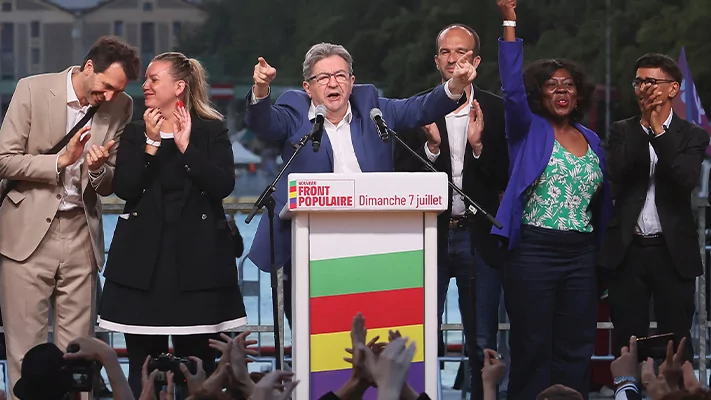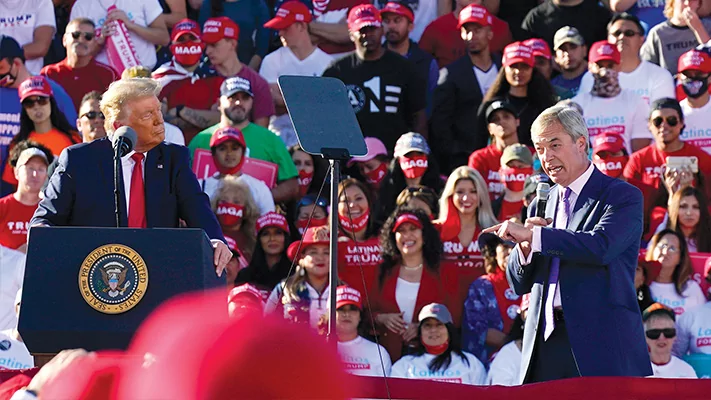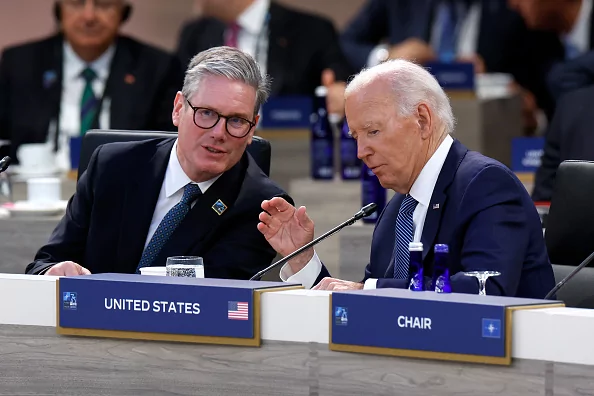
Two nations, both alike in indignity, in troubled Europe where we lay our scene. In Britain and then France, an unpopular leader called snap elections for reasons no one could quite understand. He then lost as everyone predicted, though not in the way that everyone expected. In Britain’s general elections on July 4, Rishi Sunak led his Conservatives to an epochal collapse that granted Keir Starmer’s Labour a landslide. France’s two-stage parliamentary elections, held on June 30 and July 7, were a three-way split that produced a paralyzed government and made President Emmanuel Macron the lamest of ducks.
The nationalist Right gained seats in both Britain and France. In both countries, however, the largest share of seats went to the Left, including the radical Left and its Islamist proteges and Green Party allies. In Britain, Nigel Farage’s Reform U.K. took 14% of the vote, mostly at the expense of the Conservatives, and broke into the House of Commons. The big winners were Labour, whose haul of 411 of the 650 seats nearly matched its 418 seats in Tony Blair’s 1997 landslide. The Conservatives, divided and dispirited, crashed from 365 to 121 seats, the worst result in their history.

In France, Marine Le Pen’s National Rally won the first round of voting for the first time. National Rally took 33.2%. The left-wing coalition of the New Popular Front (NFP) came second on 28.1%, with Macron’s Ensemble (“Together”) third on only 21.3%. In a shock second-round result, Le Pen’s party fell into third place but grew its representation in the 577-seat National Assembly from 89 seats in the 2022 elections to 142 seats today. The NFP, which had formed for the occasion, came first and expanded from the equivalent of 131 seats in 2022 to 180 today. Ensemble, which came out of the 2022 elections as the largest party but was short of a working majority in the National Assembly, declined further, from 245 to 159 seats. Its leader, Prime Minister Gabriel Attal, resigned.

Britain uses first-past-the-post (FPTP) voting, as in American elections. France uses a complex two-stage voting system, which combines proportional representation (PR) and FPTP. Two different electoral systems produced similar results. These echo the results of the European parliamentary elections in early June. The center is crumbling. The radicals, on the left and the right, are growing. The voters, like the Montagues and Capulets of Shakespeare’s “fair Verona” who “from ancient grudge break to new mutiny,” are redrawing the political map. Hence, the double vision.
Making plans for Nigel
Nigel Farage did not plan on running in the British elections. On May 12, Farage, a Thatcherite populist and a key architect of Brexit, announced he had received a “firm job offer” from his friend Donald Trump’s presidential campaign. On May 22, 10 days after Farage had said he would be spending most of the next six months in the United States, Sunak called snap elections.

The Conservatives were then lagging Labour by 20 points in the polls. Under British electoral law, they still had six months on the clock before they had to face the voters. But Sunak decided this was his best chance. The COVID-19 inflation boom had subsided. Britain’s economy was growing slowly, while the eurozone economies were slipping toward recession. The Conservatives’ flagship immigration policy, a daft and costly plan to export illegal immigrants to Rwanda, would not hit the legal buffers until later in the year. And Farage was out of the picture.
Farage became the most influential politician in Britain without ever winning a seat in the House of Commons. In the 2014 elections to the European Parliament, Farage, then the leader of the U.K. Independence Party, won the British vote and crushed the Conservatives into third place. To prevent an exodus of euroskeptic voters in the next general election, the Conservative prime minister, David Cameron, promised that if he won, he would call a referendum on Britain’s membership of the European Union. The Conservatives won the 2015 elections. Cameron, who expected to win the referendum, kept his word — then lost the referendum to the combined charisma of Farage and Boris Johnson.
After the referendum, Farage dropped UKIP and formed a new vehicle, the Brexit Party. He tormented Cameron’s successor, Theresa May, from outside the House of Commons as her government did its best not to honor the referendum result, then led the Brexit Party to an even greater victory in the European elections of 2019. In that year’s general elections, he withdrew every single Brexit Party candidate, ensuring that the right-wing vote coalesced around Johnson’s Conservatives. Johnson won a landslide, Brexit went through Parliament, and Britain left the EU on Jan. 31, 2020.
Farage planted his thumb in several political pies. He became honorary chairman of yet another startup party, Reform U.K. He began a new career as a host on GB News, an upstart conservative TV channel. He resumed his side gig as hype man to Trump. Evermore influential, he grew increasingly outraged as the Conservatives, who had promised tight immigration controls in 2019, allowed the number of immigrants, legal and illegal, to go through the roof. Farage accused the Conservatives of betrayal. Millions of their 2019 voters agreed. Reform U.K.’s numbers crept up into double figures.
Two weeks after Sunak called the election, Farage announced he was running after all. Farage is warm and witty and a natural campaigner. Sunak and Starmer are bland technocrats. No one cared what the Conservatives had to say. Labour did not need to defend its policies. Public patience and personal finances were collapsing after 14 years of inept Conservative rule. Starmer played a “Ming vase” game, acting like a safe pair of hands. Reform U.K.’s vote surged again, even polling ahead of the Conservatives in a couple of polls. The “extinction-level event” that Conservatives had feared was happening.
Party favors
On Election Day, Britain’s FPTP system worked as intended. The system amplified the popularity of the party with the most votes and endowed Labour with a massive majority. At the same time, the result did not reflect public opinion. Most electoral systems generate a degree of distortion between vote shares and representative outcomes. The distortion is typically an effect of buffering against the volatile potential of direct democracy. When the distortion is too great, and especially when the issues over which the elections were fought are unresolved, the question of legitimacy arises.
In the U.S., the Republican winners of the 2000 and 2016 elections lost the popular vote but carried the Electoral College. The response from the losing side was intense in both cases, though the distortion was relatively small. In 2000, Al Gore defeated George W. Bush in the popular vote by 0.5 points: 48.4% to 47.9%. Bush’s five-vote margin of victory in the 538-vote Electoral College was less than 1% of its total votes. In 2016, Hillary Clinton defeated Trump in the popular vote by 2.1 points: 48.2% to 46.1%. Trump’s 77-vote lead in the Electoral College topped 14% of the votes. It was the biggest distortion of its kind in American history.

In Britain on July 4, Labour won 63% of the seats with only 33.7% of the vote. The Conservatives won 18% of the seats on 23.7% of the vote, a distortion typical of British elections. The distortion between Labour’s votes and seats was, however, nearly 30 points. This is the most extreme case in British electoral history. The previous record, a 22-point distortion, was an earlier Labour victory, Blair’s second-term reelection win of 2001. The distortion is amplified by a feeble turnout, which fell from 67.3% in 2019 to just under 60% — again, the previous record low was from 2001. The differences between then and now are twofold.
In 2001, Britain’s third party, the Liberal Democrats, was too small to matter. Labour’s vote was big enough to ensure that the result would have been the same whether the votes were counted by FPTP or PR. This year, Britain had two third parties that mattered: Reform U.K. and the Liberal Democrats. The vote shares also show that exchanging FPTP for PR would have produced a different government, probably a Labour-Liberal Democrats coalition, rather than the landslide that gives Labour a free hand.
Labour won by a massive margin because the Conservative vote nearly halved, from 43.6% in 2019 to 23.7%. More than half of the defectors turned to Reform U.K., which won an estimated 14% of the vote. Yet because Reform U.K.’s vote was evenly spread around the country, the party won only five seats — and it came second to Labour or the Liberal Democrats in a further 98 seats. The Liberal Democrats ran a targeted campaign and won 72 seats. Their seat share (11%) matched their share of the national vote (12.2%) and now makes them the third-biggest party in the new government. But the Liberal Democrats won 14 times as many seats as Reform U.K. with a smaller share of the popular vote.
This would matter less had Labour performed convincingly in the popular vote. In 2017, Labour, then led by the Trotskyite Jew-baiter Jeremy Corbyn, won 12.88 million votes and lost narrowly to May’s Conservatives. In 2019, Labour, still led by Corbyn, won 10.27 million votes and lost massively to Johnson’s Conservatives. This year, Labour, led by the studiously moderate Starmer, won only 9.3 million votes — and triumphed in a landslide.
FPTP favors the historic duopoly of the Conservatives and Labour. Their joint vote share fell to 57.4% this year, its lowest ever. Starmer’s reach is broad, but his popularity is shallow. The notion of legitimacy is less procedural — there is little evidence of electoral fraud in Britain than moral. If British voters want a multiparty system but the British electoral system denies its expression, something will have to give. Naturally, Farage, the Greens, and the Liberal Democrats all favor moving to PR. Naturally, Labour and the Conservatives prefer FPTP. To see why, they need only look at the chaos across the English Channel.
The French involution
The British electoral system has the virtues and failings of simplicity. The electoral system of the French Fifth Republic intends to produce a simple and virtuous result, a strong presidency and a Parliament managed by a moderate and democratic party, by a complex and sometimes flexible two-stage vote. This has now produced the outcomes it is designed to avoid: a presidency divided from the Parliament and a Parliament in which radicals of the Left and the Right outnumber moderates. France, the land of political revolutions, is in a state of political involution: self-absorbed and frustrated, with an electoral system that has turned against itself.
Created in 1958 by Charles de Gaulle, the Fifth Republic is a political hybrid. The prime minister manages the National Assembly, the legislative branch. The president is elected directly. The prime minister is chosen by proportional representation and, if his or her party fails to win an absolute majority in the National Assembly, is usually the leader of the largest party.
When the presidency and Parliament align as intended, the result is a powerful executive and a supportive Parliament. When they fall out of alignment, the gears are jammed American-style by divided government, or cohabitation. Cohabitation did not occur until 1986-88. It recurred in 1993-95 and 1997-2002. It was predicted as soon as Macron called this year’s parliamentary elections. As with Sunak, you wonder why he did it.
In the European Parliament elections on June 9, the nationalist right-wingers of National Rally, led by Le Pen’s telegenic young protege Jordan Bardella, won the largest share of French votes (31.37%) and 30 seats. France’s real far-right parties won another 8%. Macron’s astroturfed coalition fell to 14.6% and 14 seats. Macron responded by dissolving the National Assembly. “This is an essential time for clarification,” he said. “France needs a clear majority to act in serenity and harmony.”
To no one’s surprise, the elections produced neither a clear majority nor serenity — and even less harmony. The first round of a French election uses both PR and FPTP. To win in the first round, a candidate must take more than half the votes and the votes of at least 25% of registered voters. Otherwise, any candidate who wins the support of more than 12.5% of registered voters goes through to the second round, which is FPTP.
As expected, Le Pen and National Rally won the first round, with 37% of the votes. The newly formed NFP bloc came second on 28.1%. Macron’s Ensemble came third on 21.3%. As expected, Macron issued the now-traditional centrist’s call for a “republican front” against the extremists in the second round, with tactical voting to protect the virtue of the Fifth Republic from being further sullied by the Le Pen family. Then, the surprises began.
The NFP’s largest element, the communists of Jean-Luc Mélenchon’s La France Insoumise (“France Unbowed”) are more friendly to Russian President Vladimir Putin and more hostile to the EU than Le Pen is. They are also, unlike Le Pen, hostile to Israel and always willing to pander to Islamists and the Muslim vote. Mélenchon is antisemitic even by French standards. The Fifth Republic was created to keep extremists like him out of office, yet now the Socialists, supposedly the sensible center-left party, were junior partners in his electoral coalition. And Macron, who is a consummate centrist in his self-centered way, was calling for his followers to drop out of the second round to prevent Le Pen’s party from winning the runoff.
As Farage had made way for Johnson in Britain in 2019, so now a French president made way for the communists and Islamists. By Le Monde’s count, only 76 of France’s 577 constituencies produced a first-round winner. Thirty-seven of them went to National Rally. The three-way split meant that an unprecedented 306 districts were set for second-round triangulaire (three-way) runoff elections and five districts for four-way runoff elections. National Rally had the most second-round candidates: 444 to the NFP’s 415 and Ensemble’s 321, with the Republicans trailing on 63. That, however, was before Macron and the left-wing bloc blocked National Rally by selectively withdrawing their candidates from each other’s path. More than 200 candidates, 134 of them from the NFP and 82 from Ensemble, dropped out. This reduced the number of triangulaires from 306 to 89. In dozens of districts, voters were given a false choice between extremes: Le Pen or Mélenchon?
France unmoored
The second-round result might be called a Pyrrhic defeat. If Macron’s strategy was to defeat Le Pen at all costs, he succeeded. National Rally came in third in the second round, with 143 seats. If Macron’s plan was to rally the “republican front” and defeat Mélenchon and the Left, too, he was defeated. Although the NFP had withdrawn more candidates than Ensemble, Macron’s alliance still failed to lead the results. Ensemble’s seat count fell from to 245 to 168 seats, while National Rally’s rose from 89 to 142, its highest count yet.
The real winner, with the largest seat share, was the NFP, up 43 seats to 180. The result was not so much a hung Parliament as one that stretches the sinews connecting presidency and Parliament to the breaking point. The ideological antagonism between Macron and Mélenchon exceeds the limited precedents for cohabitation. Attal has resigned, making his term the shortest of any prime minister under the Fifth Republic. Macron, who now warns of “civil war,” has refused to accept Attal’s resignation. A year of gridlock and rancor waits before Macron can call new elections.
This is a moral and political catastrophe. Instead of securing the center, the clarifying effect of FPTP is pushing Macron into cohabitation with communists, eco-cranks, and bigots — further polarizing French politics and fortifying Le Pen’s vote in the 2027 presidential elections. Peeling off moderate Socialists from Mélenchon’s alliance and opportunists from the shrunken rump of center-right Republicans may not give Macron’s alliance a majority, but it will further discredit the electoral system. Perhaps its leaders can assemble ad hoc votes, issue by issue. Perhaps Macron, who enjoys a theatrical flourish, will resign. Or perhaps the French farce will spill into the EU.
Under Macron, the French state has broken its commitment as an EU member to run a deficit of no more than 3%. Before the elections, a Bloomberg analysis of the parties’ economic platforms predicted that Macron’s spending program would raise debt to the equivalent of 110% of gross domestic product. The NFP promised 150 billion euros in new spending, an instant 10% pay rise to all public sector employees, free public transportation, hiring more teachers and healthcare workers, investing in green energy, and lowering the retirement age to 62. A Bloomberg analysis predicted that NFP’s program would raise debt as a percentage of GDP to nearly 130%. National Rally’s spending plans are almost as extravagant and similarly statist and would raise debt as a percentage of GDP to 120%.
True, as one of the EU’s two pillars, France can play by different rules. Austerity is for the little people such as Greece. This is a political calculation, depending on Germany’s surplus of payments and exploiting Germany’s historical wariness of instability and the EU’s proven preference for institutional amity over economic growth. Other political calculations, such as Germany’s fear of debt and the EU’s limited legitimacy, mean the EU has not hardened the eurozone’s fiscal defenses since the debt crisis of 2011.
CLICK HERE TO READ MORE FROM THE WASHINGTON EXAMINER
The markets are not a political project. The premium on French bonds compared to German bonds reached its highest level since 2012 after Macron called the elections. When the prospect of a National Rally victory in the second round led to sell-offs in the bond markets, the National Rally reduced its spending plans. The NFP alliance, and Mélenchon’s LFI especially, did not blink. Moody’s has warned that it may downgrade France’s credit rating from stable to negative.
France is without a government. Mélenchon remains committed to his spending plans. They will send France into the kind of confrontation with the markets that unseated Sunak’s predecessor, Liz Truss, and paved the way for Labour’s victory on July 4. In Britain, the failure of the Right invited the Left back into office. In France, the overreach of the Left will continue the Right’s slow conquest of Europe. No electoral system can delay that forever, and in this case, its malfunction has accelerated France’s crisis of government. Le Pen has never looked more likely to win the 2027 presidential elections.







